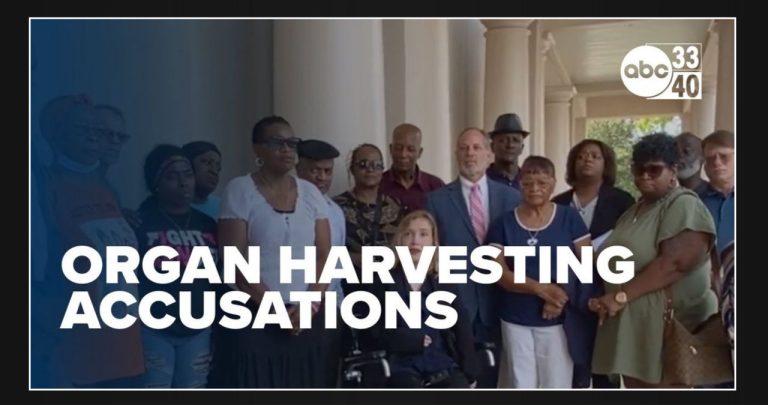Montgomery News (Mocobizscene) –
On March 7, 2023, in Montgomery, Alabama, Gov. Kay Ivey stands at attention during the National Anthem before giving the State of the State speech. (Steve Milne for Alabama Reflector)
The office of Gov. Kay Ivey has hired a Montgomery law company for $100,000 to defend the office against a lawsuit filed by the family of a man who was put to death by the state last year.
Thursday, the contract was passed by the Contract Review Committee of the Legislature. It is worth about $195 an hour.
The committee asked for more information about when the deal would start. After the meeting, Sen. Dan Roberts, a Republican from Mountain Brook, told reporters that he was told it was May 25.
He said, “I think that was last year.”
The case was filed by Joe Nathan James, Jr.’s family and estate. He was put to death on July 30, 2022, for killing his ex-girlfriend Faith Hall. Hall’s family was against putting him to death.
James’s execution was put off for about three hours, and media people who were allowed into the room where it happened said that he looked like he was asleep and had his eyes closed. Most of the time, prisoners are awake when an execution starts and are given the chance to say their last words.
John Hamm, the head of the Alabama Department of Corrections, told reporters that James wasn’t put to sleep, but he couldn’t swear that James was awake. ADOC turned down a request for information about James’s execution.
In a statement released Thursday, the governor’s office said it would “defend our duty to the law and upholding justice.” Arnold & Porter, the law firm that works for the plaintiffs, was asked for reaction Thursday.
Hakim James, Joe Nathan James’s brother and one of the people suing in this case, let The Atlantic see his brother’s autopsy. Joel Zivot, who was at the autopsy, said that James probably had a long death and that it probably involved a “cutdown,” which is when veins are exposed to make it easier for the executioners to see.
Zivot said that it wasn’t clear how a local sedative was used. Mark Edgar, a pathologist in the Department of Laboratory Medicine and Pathology at the Mayo Clinic in Jacksonville, Florida, looked at pictures and said that James had wounds that showed he moved while the IV was being set up.
The case says that the state broke James’ Eighth Amendment rights against cruel and unusual punishment and his 14th Amendment rights to due process.
“The facts available demonstrate that Defendants unconstitutionally subjected Mr. James to excessive pain during his prolonged execution and deprived him of the right to be conscious and speak his final words before the administration of the lethal drugs,” the complaint said.
The filing says that the time it took to carry out the plan was much longer than the time it would have taken a “competent team” to set up two IVs.
The case also says that Alabama has messed up a lot of executions in the past. In 2018, the state stopped the execution of Doyle Lee Hamm because the people who were supposed to do it couldn’t find a good vein. Hamm’s lawyers said that he started bleeding on the bed. Later, the state and Hamm’s lawyers agreed not to try to kill him a second time. Hamm died in 2021 from cancer.
The lawsuit also talks about the failed efforts to put IV lines in the veins of Alan Eugene Miller and Kenneth Smith, whose executions were supposed to happen later in 2022 but were called off after many tries.
“Unfortunately for Mr. James, ADOC’s recognition of the flaws in its execution procedures—and the resulting unlawful pain and suffering and deprivation of rights—came too late,” said the filing.
In a filing on July 3, lawyers for the state said that Alabama has qualified immunity on the claims and that the claimants don’t have a case because James’ claims ended with his death.
In a footnote to the statement, lawyers for the state said that Dr. Boris Datnow’s affidavit showed that the plaintiffs’ claims were not true.
“Dr. Boris Datnow noted ‘no signs of a struggle, no excessive bruising beyond that typically found with intravenous access, no signs of excessive needle punctures, and no signs of torture or other abuse’ as well as ‘[n]othing, that ‘suggested that Mr. James had been administered an intramuscular sedative,’” lawyers for the attorney general’s office wrote.
The state says that a personal representative can’t bring a tort case other than one for wrongful death. This affects three of the plaintiffs’ claims. The state also says that unjust death claims can only be made if the wrongdoing was the cause of death, and James’ death was due to his planned execution.
“Taken together, these rules show that plaintiff cannot bring the claims alleged in the Complaint,” wrote the attorney general’s office lawyers.
On July 10, Chief U.S. Magistrate Judge Stephen M. Doyle told the suit to give a reason by July 31. On July 12, the lawyer for the complainant asked for a delay until August 17. Doyle agreed to this.
On July 31, the case was given to Judge Emily C. Marks.
Fresh News From Montgomery –
- Scene Video: A chase after a car that was stolen ends on Vaughn Lane in Montgomery
- The pursuit of a stolen vehicle ends with an I-85 smash into a Montgomery police unit
Stay in the Loop: Get the latest news and updates on MocoBizScene.com!



